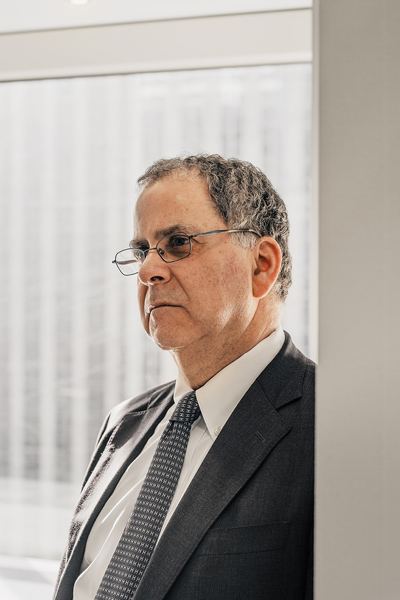Michael Herman stood on the balcony of his glassy condo, cradling his coffee. It was a gorgeous morning. The sun slanted over the Don River Valley and made the city skyline look like it was sparkling. He should have felt something like serenity. But, instead, a terrifying thought flicked through his mind. What, he wondered despondently, is the point of all this anyway?
Herman looked over the edge of the balcony. Then he stepped back from the railing. What is happening here? he thought. The darkness in his mind was entirely discordant with the rest of his life. At work, he was a partner and the general counsel at Gowling WLG, where he’d worked for eleven years. At home, he had a loving wife and so much to live for. “It scared the crap out of me,” says the 65-year-old. “I realized I must be seriously depressed.”
It was the summer of 2017. Herman was in the midst of a multi-year struggle with his health, but he had always thought of his ailments as physical. The first sign of trouble came, in August 2015, when he started to experience sporadic dizzy spells and an erratic heartbeat. A few weeks after the onset of these episodes, he passed out in a firm boardroom. He decided to see a cardiologist, who diagnosed him with atrial fibrillation — an electrical problem in the heart that causes it to misfire — and prescribed him medication.
That made things worse. Not only did the medication fail to ease his erratic heartbeat, but the side effects — intense fatigue and gastrointestinal issues, alongside flu and cold symptoms — were awful. “Between December of 2016 and February of 2017, I lost about 25 pounds,” says Herman. “I was sick and going to work. I was just doing the best I could.”
In March of 2017, he reached a breaking point. He took a leave from work and underwent a procedure called an ablation, which destroys tissues that can disrupt electrical signals in the heart. It did eliminate his erratic heartbeat, so, in June, he returned to work. But he still felt terrible. “I had tremendous fatigue,” he says. “I was achy and in pain. My digestion had gone completely haywire and I wasn’t retaining any nutrients.”

“Self-care is a dirty word in our profession,” says Herman. “We are so determined not to show any weakness”
He tried to work through the pain, but after three weeks he went back on leave. Medical tests showed no illness. And his doctor told him there was nothing wrong. “I had all of these problems no one could explain,” says Herman. “My mental state was not great. I was agitated all the time.”
That’s when Herman, standing on his balcony, first questioned whether there was a point to his life. It was at once terrifying and revelatory. Herman had always expected that, once he dealt with his heart problems, his life would return to normal. But he now saw that his mind was sick, too.
By this point, Herman started to take care of his mental health. He met with a psychiatric specialist, who diagnosed him with depression and prescribed him a mild dose of antidepressants. He started to see a therapist and found a nutritionist. And he began to exercise on a stationary bike and practise yoga.
Slowly, he began to feel better. And as his mental health improved, he gradually began to return to work. First, it was a few hours a day working from home. Three months later, he spent three days a week at the office. And in February of 2018, he returned to work full-time.
Back at the office, Herman disclosed his condition to the firm’s internal managing partner, Tina Woodside. She was unequivocally supportive. “As we have more conversations about mental health, I believe we’re reducing stigma,” says Woodside. “People are becoming more comfortable in coming forward to discuss their mental health, which is a very good thing.”
So why did it take Herman so long to consider that he might be suffering from a mental illness? “Self-care is a dirty word in our profession,” he says. “We are so determined not to show any weakness.” In his view, this increases the likelihood of denial. Herman, afraid to betray any vulnerability, never wanted to confront the fact that his mind might be unwell.
The legal profession, he argues, should change. “We need to create an environment where people feel safe and comfortable,” he says. “People need to feel like they can make mistakes and the world isn’t going to come to an end.”
There is no quick fix, however. Mental illness is incredibly complex. Even with treatment, Herman hasn’t untangled the root cause of his depression. It could have been environmental, the result of a long career in a high-stress profession. It might have been ignited by his physical health issues, which dogged his life for several years as his doctors struggled to explain his symptoms. Or it may have been genetic, biding its time but there all along.
When Herman stands on his balcony now, watching the morning sun rise over the skyline, he holds a cup of hot water with a slice of lemon. He spends this first part of the day journalling, instead of reading his emails right away. He’s also learned that, as a lawyer and a person, it’s okay to say that he doesn’t know the answer. “I try to put what I do as a lawyer in perspective,” says Herman. “It’s only part of who I am. And while I will always strive for excellence, hopefully I can accept that I don’t need to be perfect. The recovery never ends. I hit bumps, I hit obstacles, I hit challenges. And that’s okay. It takes intention and attention, but it’s okay.”
This story is from our Spring 2019 Issue.
Photography by Ian Patterson


